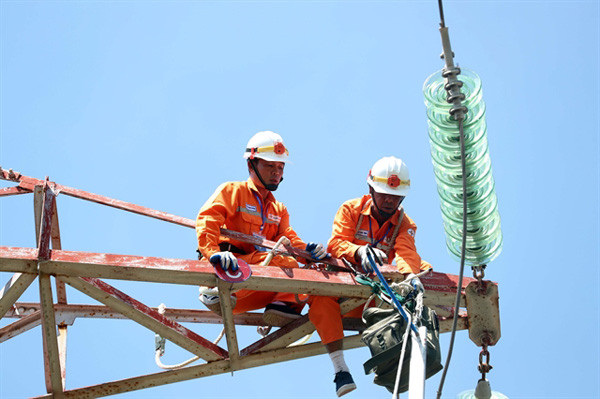
The bracket of average electricity retail prices has been increased to VND1,826.22 per kWh for the floor price and 2,444.09 for the ceiling price, according to the Prime Minister’s Decision No 02/2023/QĐ-TTg dated on February 3.
Compared to the previous bracket, which has been applied since 2017, the floor price increased by VND220 and the ceiling price by VND538 per kWh.
The adjustment of the bracket would not immediately impact prices.
The bracket and the inspection results of the electricity production and business costs in 2022 would be the base for the Ministry of Industry to decide on the average electricity retail price for this year.
The Ministry of Industry and Trade recently urged Vietnam Electricity (EVN) to urgently complete the average electricity retail price plan for this year.
EVN must complete the final resettlement of electricity production and business costs in 2022 and have it audited following the established regulations, which would serve as the base for the Ministry of Industry and Trade to develop an appropriate roadmap for adjusting electricity retail prices in 2023.
The ministry’s push comes as EVN seeks approval for a proposal to adjust average electricity prices to ensure its financial balance in 2023 and protect the State investment at EVN.
EVN also proposed that the electricity transmission price be increased by nearly 4 per cent to VND79,09/kWh, compared to the VND74.85/kWH approved in May 2022. This ensured that the National Power Transmission Corporation did not incur a loss.
In the Ministry of Industry and Trade's report, EVN said it incurred a loss of around VND31 trillion in 2022.
If the electricity retail prices were kept the same, EVN might incur a loss of up to VND64.9 trillion in 2023, which would cause EVN to struggle with balancing the operating cash flow.
Deputy Minister of Industry and Trade Do Thang Hai said at the Government’s monthly meeting late last week that the adjustment of electricity prices was regulated by the Prime Minister’s Decision No 24/2017/QĐ-TTG dated June 30, 2017.
If the changes in input costs made the average electricity retail price increase or decrease by 3 per cent or more, the electricity was allowed to be adjusted correspondingly. If the adjustment were 10 per higher than the current rate, the Ministry of Industry and Trade and the Ministry of Finance would check and report to the Prime Minister for a decision.
He said that because the electricity price had huge impacts on the macroeconomy and daily life, the ministry asked EVN to work with relevant agencies to carefully assess the impacts of the adjustments on the macroeconomic situation and each group and customer to develop a roadmap to adjust electricity prices appropriately in 2023.
Regarding the loss of EVN, Hai said that the Prime Minister asked the Commission for the Management of State Capital at Enterprises to cooperate with relevant ministries and agencies to study tackling measures besides increasing electricity prices.
Also at a conference last week, Prime Minster Pham Minh Chinh said that the electricity prices in Vietnam must be carefully calculated to ensure the harmonisation of targets.
Phung Duc Tung, Director of Mekong Development Research Institute, said that an increase in electricity prices would happen sooner or later because the pressure of increasing input costs for electricity production had not shown any signs of cooling down.
He said that increasing electricity prices to the market level was also a way to promote private investment in the electricity industry.
The current average electricity retail price was VND1,864.44 per kWh ($0.08 per kWh), which has remained unchanged since 2019.
According to Globalpetrolprices, this price was 50 per cent lower than the Philippines, which had the highest electricity price in the region at $0.172 per kWh and also lower than Indonesia, Thailand, and most developed countries. Electricity prices in Vietnam were higher than in some countries, such as Laos, Russia, Bangladesh, India and Turkey.
Source: Vietnam News